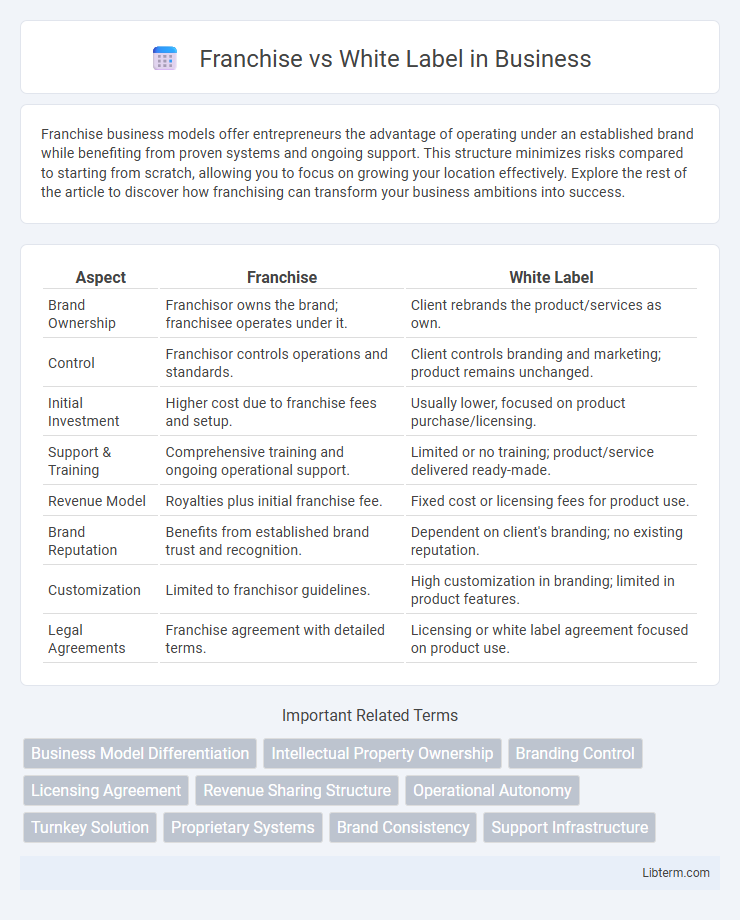Franchise business models offer entrepreneurs the advantage of operating under an established brand while benefiting from proven systems and ongoing support. This structure minimizes risks compared to starting from scratch, allowing you to focus on growing your location effectively. Explore the rest of the article to discover how franchising can transform your business ambitions into success.
Table of Comparison
| Aspect | Franchise | White Label |
|---|---|---|
| Brand Ownership | Franchisor owns the brand; franchisee operates under it. | Client rebrands the product/services as own. |
| Control | Franchisor controls operations and standards. | Client controls branding and marketing; product remains unchanged. |
| Initial Investment | Higher cost due to franchise fees and setup. | Usually lower, focused on product purchase/licensing. |
| Support & Training | Comprehensive training and ongoing operational support. | Limited or no training; product/service delivered ready-made. |
| Revenue Model | Royalties plus initial franchise fee. | Fixed cost or licensing fees for product use. |
| Brand Reputation | Benefits from established brand trust and recognition. | Dependent on client's branding; no existing reputation. |
| Customization | Limited to franchisor guidelines. | High customization in branding; limited in product features. |
| Legal Agreements | Franchise agreement with detailed terms. | Licensing or white label agreement focused on product use. |
Introduction to Franchise vs White Label
Franchise and white label models differ primarily in brand control and operational structure, with franchises allowing franchisees to operate under an established brand while following strict corporate guidelines. In contrast, white label products enable companies to rebrand generic products or services as their own with minimal involvement from the original manufacturer. Understanding these distinctions is crucial for businesses seeking scalable growth and brand identity strategies.
Definitions: Franchise and White Label Explained
Franchise involves a legal agreement where a franchisor grants a franchisee the right to operate a business using its brand, products, and operational model, ensuring consistent standards. White label refers to a product or service produced by one company and rebranded by another to make it appear as their own, allowing businesses to offer ready-made solutions quickly. Franchise emphasizes brand control and business format, while white label focuses on product customization without altering the core production.
Key Differences Between Franchise and White Label
Franchise agreements grant the franchisee the right to operate under the franchisor's established brand, using their business model, trademarks, and ongoing support, while maintaining consistent operational standards. White label arrangements involve a company selling products or services produced by another business under its own brand name, typically without direct operational control or continuous franchisor support. The key differences lie in branding control, operational involvement, and the level of support and training provided, with franchises offering comprehensive systems and white label focusing on rebranding pre-made products.
Business Models: How Each Operates
Franchise business models involve a franchisor granting the franchisee the rights to operate using its established brand, systems, and support, ensuring consistency and brand recognition across locations. White label models allow businesses to rebrand a generic product or service created by another company, enabling quick market entry without developing products from scratch. Franchising emphasizes brand control and operational training, while white labeling focuses on product customization and fast scalability.
Investment and Cost Comparison
Franchise models typically require higher initial investment fees and ongoing royalty payments, reflecting brand support and operational guidelines provided by the franchisor. White label solutions often involve lower upfront costs, with expenses mainly tied to product customization and licensing fees without the need for extensive brand marketing. Comparing cost structures, franchises demand more capital for established brand leverage, while white label investments offer budget-friendly adaptability with fewer financial obligations.
Branding and Marketing Control
Franchise agreements grant the franchisor significant control over branding and marketing strategies, ensuring consistent brand identity and customer experience across all locations. In contrast, white label arrangements allow the buyer greater flexibility to customize branding and marketing, often rebranding products or services under their own name while sourcing from a third party. This difference impacts how companies build brand equity and approach market positioning, with franchises adhering to strict guidelines and white labelers exercising more autonomy.
Legal and Regulatory Considerations
Franchise agreements impose strict legal requirements regarding disclosure, intellectual property rights, and operational standards to protect both franchisors and franchisees under franchise laws. White label arrangements typically involve fewer regulatory obligations but require clear contracts to define branding, liability, and compliance responsibilities, especially in sectors with consumer protection regulations. Understanding jurisdiction-specific franchising laws and commercial codes is crucial for structuring compliant franchise or white label partnerships.
Pros and Cons of Franchising
Franchising offers the advantage of leveraging an established brand, which can accelerate market entry and increase customer trust, while providing comprehensive support and training from the franchisor. However, franchising requires adherence to strict operational guidelines, limits entrepreneurial freedom, and involves ongoing royalty fees that reduce profit margins. The franchise model also benefits from a proven business concept but can be costly to start and may face challenges if the franchisor's reputation declines.
Pros and Cons of White Labeling
White labeling enables businesses to quickly enter markets by selling pre-made products under their own brand, reducing development time and upfront costs. However, it limits customization options and brand differentiation, potentially leading to lower customer loyalty and less control over product quality. Dependence on the white label provider's reliability and support can also pose risks to scalability and long-term business success.
Choosing the Best Model for Your Business Goals
Choosing between franchise and white label models depends on your business goals, control preferences, and investment capacity. Franchise models offer a proven brand, comprehensive support, and stricter operational guidelines, ideal for entrepreneurs seeking brand recognition and structured growth. White label solutions provide flexibility, lower startup costs, and opportunities for customization, suited for businesses aiming to quickly enter markets with less overhead and more independence.
Franchise Infographic

 libterm.com
libterm.com